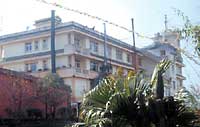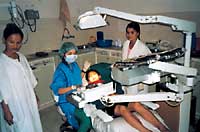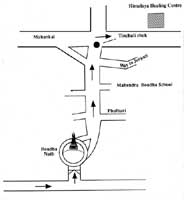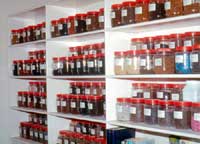|
|
||||
|
Himalayan Healing Centre,
Kathmandu, Nepal, at the service |
||||
|
Urbanization in developing countries is a global phenomenon and the world's urban population has rapidly increased from 25% in 1995 to 45% today. It is estimated to reach 60% by 2015. Over the past decade, the rate of urbanization in Nepal has been extremely rapid. Similarly, the number of factories and industrial complexes within large cities such as Kathmandu and Biratnagar, have increased nearly threefold, with similar increases in employee populations. The conditions in these factories are usually very poor and the workers - mostly arriving from remote areas of Nepal to the Kathmandu Valley to look for work - have very low incomes and are therefore unable to afford medical services. The poor die at home, and the sick have to tolerate their suffering. His Majesty’s Government of Nepal has allocated 116 rupees (less than US$ 2) per person in health allowance in order to fulfil the requirements of the health sector. It is however insufficient, and as a result the private medical sector has «boomed» with the setting up of many medical colleges and nursing homes in Nepal. However - just a short work from Boudhanath - situated in an area where many carpet factories have been established is a medical centre with a different philosophy. The Himalayan Healing Center Clinic - standing on Tinchuli hill, overlooking the Kathmandu Valley and the community which it has served for the past seven years - is a non-profit organization working in association with BP Memorial Health Foundation and was built with the precise aim of providing quality health care services at minimal cost for the local population. Operational since 1993, the construction is made up of a large residential conference centre and two smaller buildings housing five clinics, a pharmacy and office. The Clinic, whose facilities are constantly updated, is open daily and offers a range of services from general health check-ups to minor surgical procedures, dental care to basic laboratory tests of blood and urine. In 1996, a reproductive health, sexually transmitted disease awareness and family planning programme was launched from the Clinic, offering for the first time these facilities to many of an estimated thirty thousand local inhabitants. Immunisation programmes for babies and young children were also initiated in June 1997 and continue twice monthly with great success. A tuberculosis clinic (in collaboration with the National Tuberculosis Centre) has also been launched and is now treating TB patients free of charge. Built with the purpose of offering the best possible cure to each patient, a traditional Himalayan doctor is also on site allowing people the right to choose which kind of medical care they would like to receive. The Clinic frequently hosts volunteer doctors and dentists from the West who generously offer their time, knowledge and skills to helping the most needy. The Clinic charges a nominal fee of 10 rupees (l5 U.S. cents) per visit to those who can afford it, although in cases of extreme poverty everything is free, and in the event of an emergency the Clinic takes care of the cost of the transportation to a main hospital. This means that the Clinic requires constant funding and is not yet self-supporting. Since the Clinic opened its doors, until the present day, these funds are kindly donated by local business man Mr Tsetan Gyurme and his wife Sonam - whose generosity also allowed the building of the centre - who provide each month whatever amount of money is necessary to let the Clinic continue to function. From 1995 to 1998, the Clinic treated no less than 17,250 patients and the flow of patients is steadily increasing each year. According to the records, in 1998 a total of 6000 people were assisted by the Clinic increasing to 7611 in 1999 of which: 1,838 were people treated for reproductive health problems, including contraceptive advice, counselling and treatment of sexually transmitted diseases; 2,951 were people treated for general health problems; 55 were people treated in the tuberculosis «dots» program and a record 2,767 were people treated in the dental studio! These figures do not include the hundreds of children who regurlarly pass through the gates of the Clinic to receive vaccinations which protect them against crippling diseases such as polio. But the dedicated staff of this friendly and reliable medical organisation - not satisfied with the help they are already providing to the poor of the area by offering all kinds of healthcare, guidance and general help - have recently initiated an «Emergency Fund». The aim of this Fund is simple - to help pay for operations, investigative examinations and treatments in hospital for people who may otherwise die from curable diseases if they are left untreated. The list of patients who - recommended by the Clinic doctor to the management - are waiting for emergency funds is growing day by day. For most of them this Fund is the very last hope they have of a future... If you would like to make a donation to the «Emergency Fund» please contact «Help in Action», Via Marco Polo 13, 20124 Milan, Italy, Tel/Fax +39 02 29000521, e-mail: lgkt@libero.it or contact the Himalaying Healing Centre Clinc directly by e-mail at: hhcmedic@mail.com.np |
||||
|
|
||||





